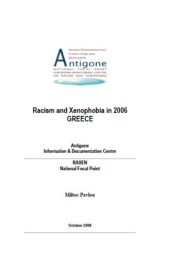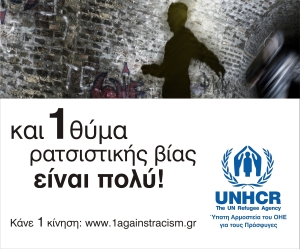RAXEN Annual Report 2006
Racism and Xenophobia in GreeceΟκτώβριος 18, 2006 - Pavlou Miltos
Executive Summary
- There are extremely few discrimination cases within the field of the anti-discrimination law. These are handled by the Greek Ombudsman, which seems to be the only fully operative Equality Body in Greece.
- There is no official case of racist violence and crime, although violence against immigrants and minorities, in many cases done by the police officers, is a reality.
- The above depict a landscape of a problematic implementation of anti-racist and anti-discrimination laws, due to institutional shortcomings and underlying attitudes.
-
Nevertheless, a number of innovative legislative initiatives in 2006, especially in regard to religious freedom, have reformed deeply rooted discrimination practices (abolition of the pre-Second World War law on approval procedures for worship places, the new law on cremation, establishment of the immigrants¡¦ councils in some municipalities)
-
There is no data available on the litigation cases before the court in discrimination matters and on the basis of the anti-discrimination law.
-
The Equal Treatment Committee, annexed to the Justice Minister, is suffering from resource and staff constraints and is not conforming to the Paris principles of independence and transparency. Up to date it has handled only one case in 2005 - the final outcome of which has not been notified - and it is currently handling two cases. Its first report to the competent Justice Minister has not been made publicly available.
-
The Labour Inspection Body, responsible for discrimination in employment, up to date has not encountered nor handled any case whatsoever.
-
The Greek Ombudsman, in its first Annual Report as Equality Body, indicates the following among the main factors underlying the present situation:a) Absence or low level of awareness among the large public and within the administration staff about anti-discrimination legislationb) Reconciliatory role of equality bodies instead of an active and pro-active one in supporting victims, as well as the non conformity of all the Equality Bodies to the Paris Principles.c) The shift of the burden of proof is implemented solely by repetition of the exact wording of the directives, failing to introduce any new legal and judicial procedures for individual cases
d) The ‘citizenship exception’ - the general clause for exception from the regulatory field of law n.3304/2005 concerning discrimination due to citizenship against the third country nationals - constitutes a precondition for extensive discrimination against foreigners due to race or national origins. Access to provision of public services and to a number of fields of employment continues to be tied to Greek citizenship and ethnic origin.
- During 2006 the exclusion of immigrant workers from employment fields, and the slow and not-yet fully implemented transposition of the long term residence status directive, reflect an immigration policy that fails to pursue integration through employment as the Common basic Principles for Immigrants’ Integration suggest.
- The Economic and Social Committee, in its Annual Report overview, recommended that a Committee should be founded in order to examine and advocate the amendment of all existing law provisions in force that introduce discrimination on the grounds of ethnic origin and citizenship, and that all Equality Body competences should be assigned to the Ombudsman, the latter being the only body capable of guaranteeing independence and efficiency of operation.
- As for education, 2006 is a starting year for a number of new EU-funded major school integration projects, which propose to design from scratch policy and tools for promoting integration of immigrants and minorities in education. The Roma children participation remains a major question to be dealt with by affronting systematically the Roma social exclusion in housing, social welfare and political participation.
- Almost half of the few discrimination cases handled by the Ombudsman were due to racial or ethnic origin, in their majority concerning Roma housing. The latter constitutes an emergency area of ‘institutionalised practices of discrimination’1, within which much tension, court litigations and intervention of international bodies were recorded.
- The anti-racist criminal law has still not been tested in court and no racist crime has been recorded as such by the police and the judicial system. Yet certain recent significant initiatives indicate a net orientation towards improving the investigation of racist motivation and prosecuting such criminal activity.
- However, the available data on violent incidents against immigrants (including two murders) and minorities indicate a consolidated or increasing trend, while opinion polls and surveys indicate a justifying or tolerant attitude towards racist crime.
ΔΗΜΟΣΙΕΥΣΗ
-
 i-RED Ετήσια Έκθεση 2011
i-RED Ετήσια Έκθεση 2011
Μάρτιος 25, 2012

 RED Annual Report 2011
RED Annual Report 2011
